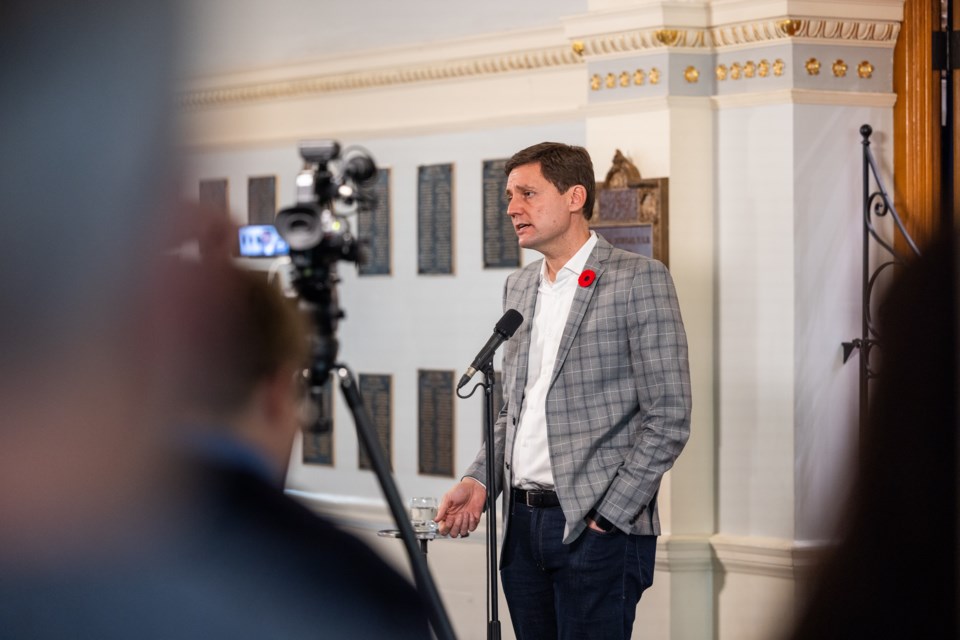Premier David Eby is hoping the third time’s the charm as he refocuses his new cabinet in his barely re-elected government onto what he calls “the basics.”
“Our focus in government will be very consistent with the message that British Columbians sent us back to the legislature with: They want us to be focused on the basics,” said Eby.
“They want us to be focused on the issues that they're thinking about around the kitchen table.”
The basics, according to Eby, are: “Affordability, their cost of daily life, whether or not they can find a place that they can afford, whether a student or young person looking for the first place, or a senior looking for a safe place to live, their health-care system is strong and supporting them, and that we're growing our economy and building strong communities.”
So: Affordability, housing, health care and the economy.
“You'll see a cabinet that is very focused on those issues and delivering for British Columbians on those priorities that they have for us,” Eby said last week.
It sounds like a government that has received a profound message from voters, listened, and is going to take a shot at solving these priority problems first. It’s certainly a narrative New Democrats are trying to reinforce.
But the illusion of change dissolves when you go back to re-read the mandate letters Eby gave his first cabinet in 2022.
“My priority as Premier is to deliver results that people can see and feel in four key areas,” Eby wrote.
“Attainable and affordable housing,” “safer communities,” “improved health care,” and “a sustainable, clean, secure and fair economy.”
Or: Affordability, housing, public safety, health care and the economy.
NDP ministers spent two years operating under those mandate letters on those issues, with minimal public satisfaction. In some cases (such as health care and safer communities) the outcomes worsened. Eby promised visible progress. None appeared.
Perhaps realizing this, the BC NDP’s election platform last month re-focused on a new plan, with new ideas, to achieve “the basics.”
“I hear you, and see you,” Eby wrote in the opening message.
The premier outlined a central strategy on “families, who worry about being able to put food on the table,” “young people, who are being priced out of the communities they live,” and “seniors, who want to know that health care will be there when they need it.”
Again: Affordability, housing, health care and the economy.
The platform laid out 65 pages of that revised vision. Voters were still unimpressed. They chopped the NDP’s 2020 majority of 57 seats down to a razor-thin 47-seat majority (only won by 22 votes in Surrey-Guildford). And they elevated the untested BC Conservatives, and their message of “common sense” on issues like affordability, from zero seats in 2020 to 44 seats and the largest official Opposition in provincial history.
Cost-of-living pressures were the biggest issue in the campaign, as the price of everything from groceries to gasoline has escalated dramatically.
The Eby government’s first two-year run on affordability was defined by small-scale BC Hydro and ICBC rebates, along with credits in areas like the carbon tax that were so strictly income-tested they missed the struggling middle class.
Version two, in the election, expanded to include $1,000 cheques that lead into a future income tax cut.
Version three, it would seem, needs to be much more ambitious.
Eby acknowledged the voter “frustration” and that his “wings were clipped.”
“They're giving us a chance to deliver on these key priorities that they have,” he said.
Yet the “key priorities” have been the same for his ministers for two years. And his government has already taken at least two big swings at improving “the basics” without achieving public success.
Eby’s got a bit of runway with his new cabinet to give it one last kick at the can. His hope is that it’s third time lucky on getting the basics right.
Rob Shaw has spent more than 16 years covering B.C. politics, now reporting for CHEK 撸奶社区 and writing for Glacier Media. He is the co-author of the national bestselling book A Matter of Confidence, host of the weekly podcast Political Capital, and a regular guest on CBC Radio.





